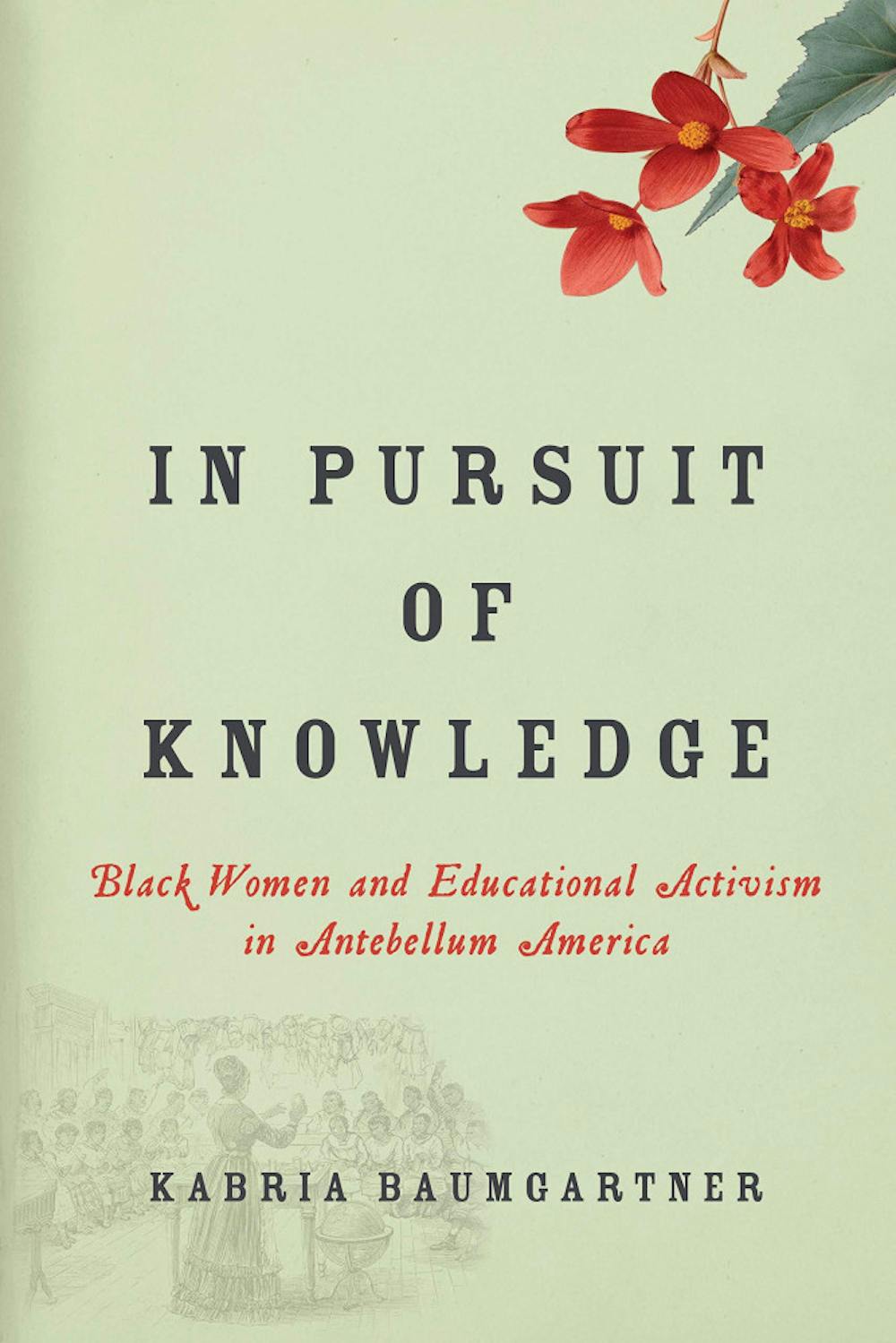On the last day of 2019, Kabria Baumgartner will become a published author, with her first book “In Pursuit of Knowledge: Black Women and Educational Activism in Antebellum America,” printed by New York University Press and spanning 320 pages.
Baumgartner is an assistant professor within the departments of English and Women’s Studies, both housed in the College of Liberal Arts.
The interest that led to this book got its start when Baumgartner - an assistant professor within the departments of English and Women’s Studies, both housed in the College of Liberal Arts – was in graduate school and attended a seminar that was taught by a professor who studied slavery.
“I got very fascinated by the innerworkings of slavery…and I wanted to know more about free black communities in the northeast in particular,” she said. “I started to see that there was something really important to them, in addition to trying to abolish slavery, trying to live their lives…they were also very interested in education.”
That focus on free black communities and education became the foothold for the book.
“It tells the story of African American girls and women who fought for educational equity, equality, and access in the 19th century northeast.” Baumgartner said. “As I was working on this project, I started to notice…that there really wasn’t a lot of scholarship on African American women’s educational experiences,” she continued, explaining that past historians had generally only studied white women’s education.
In focusing on African American women’s education, Baumgartner found “that actually African American girls and women were at the forefront of various battles, educational battles—school desegregation being a major one. I was very surprised to see how important they were.”
To find this out, Baumgartner had to delve into the historiography, which she said is the “Earlier writings by historians on a particular topic.” These writings are summaries of all the scholarship of a certain historical topic, current up to the year in which they were written. Examining the historiography allows her to see how little a topic has been studied.
Baumgartner’s book is the culmination of a decade of work, much of it focused on “uncovering and locating primary sources,” Baumgartner said, noting that she visited a variety of historical repositories and collections to find sources. This, combined with extensive drafting and revising of the book, lasted nearly 10 years.
After Baumgartner had written the manuscript, she submitted it to academic publishers, which, she said, is a “mystifying process.” She referenced the narrow niches academic and university publishers often focus on, and that it can be difficult to find a publisher whose niche fits her manuscript. Her manuscript submission including writing a proposal that explained the academic role, or niche, of the manuscript. New York University Press eagerly accepted her manuscript and helped Baumgartner edit and refine the manuscript.
This editing, however, was more focused on the actual writing of the book—how developed Baumgartner’s argument was and how the manuscript was structured. Baumgartner herself confirmed that her facts were accurate.
Now that the manuscript is finalized and the book finished, Baumgartner expressed relief, saying that this finish was her favorite part of the entire writing-publishing process.
“One [reason] is that finally I get to share what I’ve been working on for 10 years with a broader audience…I’m also just ready to start the next project,” she said.
One of her next projects is her second book, which she expects to take less time than this first one. The second book, “Bound to Servitude: Black Girls and Unfree Labor in the Shadow of Slavery”, “follows the experiences of indentured African American girls and women in the northeast,” she said. Some of this information Baumgartner learned while working on her first book, and thus she does not need to spend as much time familiarizing herself with that historiography.
While writing the first book, “I didn’t expect to find so many African American girls who had been indentured, and I realized there were actually quite a few,” she told The New Hampshire.
“I want to uncover their stories. What was it like for them to be indentured, what was it like for them to be indentured, what did the indentured contracts look like, what happened after that? Some of these questions are not easily answered…but I do think those answers are out there.” She has considered “mak[ing] the argument that in the north,” indentured servitude “was a popular form of labor, that impacted African American children” in the 19th century.
Baumgartner also spoke of Harriet Wilson, an African American novelist who had been indentured in Milford, NH.
“Harriet Wilson wrote a novel that’s often thought to be semiautobiographical, based on her experiences as indentured servant in a white household in New Hampshire…[which] was a very abusive home,” she said.
Wilson’s novel “is the first novel published by a black woman. And so, it’s very important, it’s part of the African American literary tradition.” She added that a highlight of the novel is that it was a novel published in the north and is “not necessarily a slave narrative.”
Students interested in Baumgartner’s work can enroll in the spring 2020 seminar course ENGL 690: Introduction to African American Literature in America, which will focus on author Toni Morrison.
Baumgartner is also hiring three paid undergraduate interns for next semester for another project she is working on, called a project called African Americans in Essex County, Massachusetts. “It’s a project that traces the historical collections about the African American experience,” she said. The project focuses on the historical repositories of Essex County, “cataloguing what those repositories are, what materials they hold, and what those materials say about the black experience.” Interns will work primarily on conducting research and writing.
“In Pursuit of Knowledge: Black Women and Educational Activism in Antebellum America” is available December 31 from the New York University Press.













